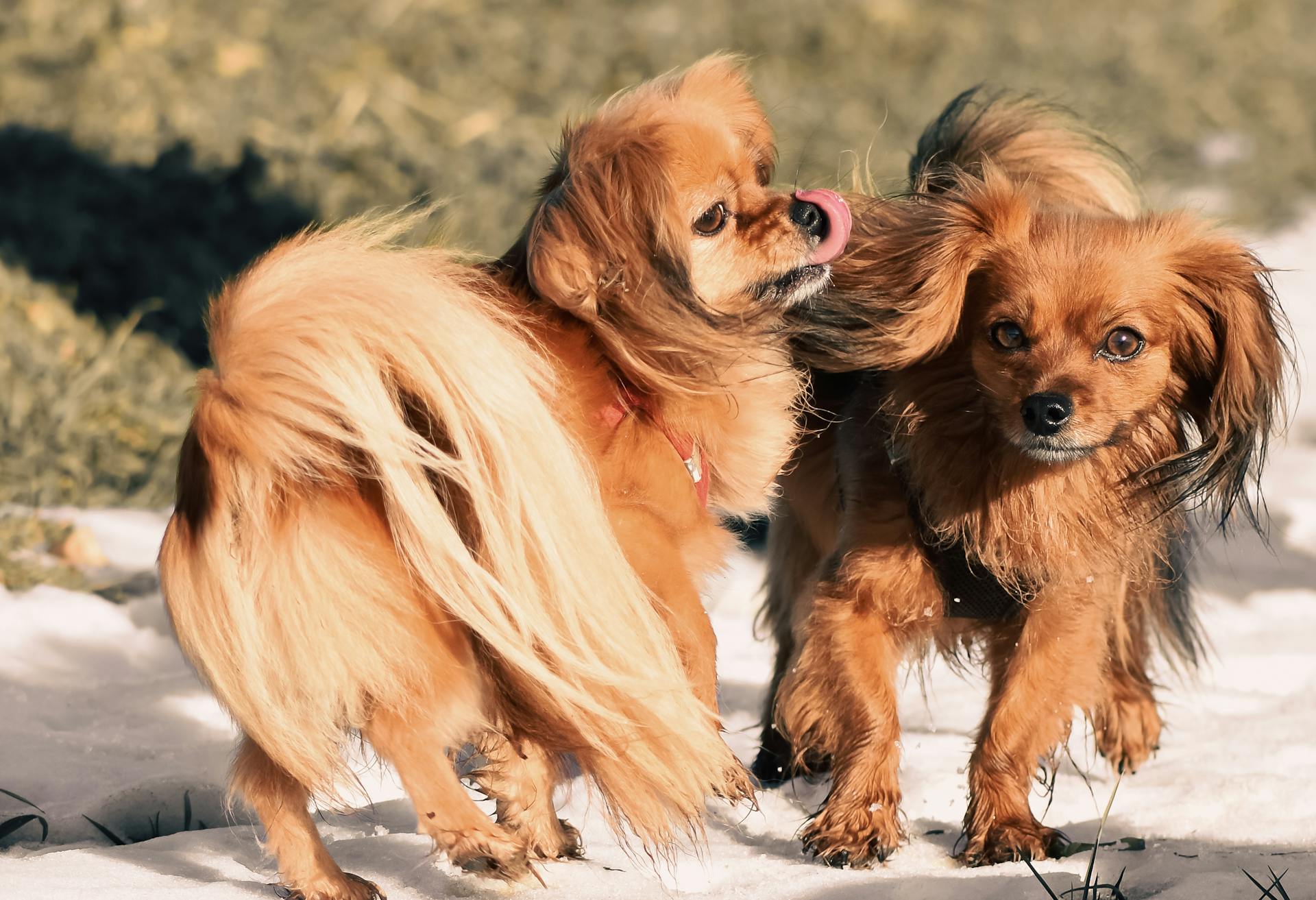
Welcoming a Tibetan Spaniel puppy into your family can be a thrilling experience, but it's essential to be prepared for the responsibilities that come with ownership.
Tibetan Spaniels are known for their gentle and affectionate nature, making them an excellent choice for families with children.
They are relatively small in size, weighing between 9-15 pounds and standing 10-14 inches tall.
Regular grooming is crucial to prevent matting and tangling of their long, silky coats.
Physical Characteristics
Tibetan Spaniel puppies are adorable, and one of the first things you'll notice about them is their small size. They stand about 10 inches high at the shoulder.
Their weight can vary, but they typically weigh between 9 to 15 pounds, making them a great companion for apartment dwellers or families with small living spaces.
Size
Tibetan Spaniels stand about 10 inches high at the shoulder.
They weigh between 9 to 15 pounds, making them a relatively small breed.
Coat Color and Grooming
The Tibetan Spaniel's coat is quite unique and requires regular grooming to keep it looking its best. Their silky double coat is smooth on the face and front of the legs, but longer on the rest of the body.
The ears, tail, and backs of the forelegs and buttocks have longer hair, and a mane of long hair surrounds the neck. This coat can be any color or mixture of colors.
Weekly brushing is essential to keep their coat free of loose hair. Expect them to shed small amounts year-round, with a heavier shed once or sometimes twice a year.
Bathe them as needed, usually every 6 to 8 weeks. Other grooming needs include dental hygiene and nail care. Brush their teeth at least two or three times a week to remove tartar buildup and bacteria.
Here are some key grooming tasks to keep in mind:
- Brush their teeth at least two or three times a week.
- Trim their nails once or twice a month.
- Bathe them every 6 to 8 weeks.
Make grooming a positive experience for your Tibetan Spaniel by handling their paws frequently and looking inside their mouth and ears. This will help them get used to it and make future grooming sessions easier.
Temperament & Intelligence
Tibetan Spaniel puppies are known for their bold, independent spirit and loving nature. They have a strong family bond and are generally reserved with strangers.
Tibetan Spaniels are incredibly smart and trainable, but they can be fiercely independent-minded and stubborn. This means they may not always obey commands, especially if they don't see a good reason to do so.
Early socialization is crucial for Tibetan Spaniel puppies to grow up to be well-rounded dogs. This involves exposing them to many different people, sights, sounds, and experiences when they're young.
Tibetan Spaniels are adaptable to different lifestyles, but they do have one demand: attention from their loved ones. They're content with almost anything involving spending time with their family.
These dogs are not suited for off-leash walks due to their strong will and tendency to wander off. They may pick a fight with a bigger dog or eat something they shouldn't.
Worth a look: Different Types of Shih Tzu Breeds
Tibetan Spaniels are generally calm and mellow, but they can be manipulative and unreliable with recall and obedience basics. They prefer to heed their own desires over following commands.
With patience and consistency, you can train your Tibetan Spaniel puppy using positive reinforcement techniques such as praise, play, and food rewards. This will help them become a well-behaved and loving companion.
Health and Care
Tibetan Spaniels are generally healthy, but like all breeds, they can get certain conditions. Not all Tibetan Spaniels will get any or all of these diseases, but it's essential to be aware of them if you're considering this breed.
To ensure your Tibetan Spaniel stays healthy, look for a breeder who has health clearances for both parents. These clearances prove that a dog's been tested for and cleared of a particular condition. Specifically, look for clearances from the Orthopedic Foundation for Animals for patellas (knees) and from the Canine Eye Registry Foundation (CERF) certifying that the eyes are normal.
Expand your knowledge: What Does a Golden Retriever Dog Look like
Here are some common health issues to be aware of:
- Progressive Retinal Atrophy (PRA)
- Patellar Luxation
- Entropion
- Cherry eye
- Portosystemic shunts
- Obesity
Tibetan Spaniels thrive on spending time with their people and can be easy to train, but they may have a mind of their own. With patience and consistency, you can teach them to stop barking after they've briefly sounded the alarm.
Health and Conditions
Tibetan Spaniels are generally healthy, but like all breeds, they can get certain conditions. Their squashed faces cause more frequent respiratory issues and heat intolerance, and they are susceptible to several eye issues, including entropion and PRA.
A reputable breeder will have their dogs' eyes certified on a yearly basis to detect PRA, a degenerative eye disorder that can lead to blindness. This is a slow process resulting from the loss of photoreceptors at the back of the eye.
Patellar Luxation, also known as "slipped stifles", is a common problem in small dogs, including Tibetan Spaniels. It's caused when the patella, which has three parts, is not properly lined up, leading to lameness in the leg or an abnormal gait.

You should expect to see health clearances from the Orthopedic Foundation for Animals for patellas (knees) and from the Canine Eye Registry Foundation (CERF) certifying that the eyes are normal. Look for a breeder who doesn't breed her dogs until they're two or three years old.
Some health problems don't appear until a dog reaches full maturity, so health clearances aren't issued to dogs younger than 2 years old. This is why it's essential to find a breeder who prioritizes their dogs' health.
Here are some common health issues in Tibetan Spaniels:
- Progressive Retinal Atrophy (PRA)
- Cherry eye
- Patellar Luxation
- Portosystemic shunt (liver shunt)
A reputable breeder will be honest and open about health problems in the breed and the incidence with which they occur in her lines. They should also provide written documentation that the parents were cleared of health problems that affect the breed.
Don't purchase a puppy from a breeder who cannot provide you with this information. Having the dogs "vet checked" is not a substitute for genetic health testing.
On a similar theme: Japanese Chin Dog Health Problems
Health and Care

To keep your Tibetan Spaniel in top shape, it's essential to measure their food and feed them twice a day. This will help prevent overeating and maintain a healthy weight.
A highly active dog will need more food than a couch potato dog, so it's crucial to consider your dog's activity level when determining their daily intake. The quality of dog food you buy also makes a difference, as better food will go further in nourishing your dog.
Tibetan Spaniels are light eaters, and adults only need roughly ½–1 cup of food daily, divided into two meals. You should be able to see a waist when looking at your dog, and feel but not see their ribs without pressing hard.
Treats are an excellent motivator for Tibetan Spaniels, but be careful not to overfeed them during training, as they can account for no more than 10% of their daily food. Working with your vet to determine the best feeding method for your dog will help keep them happy and healthy.
To prevent weight gain and related health issues, be mindful of treats and other extra food your dog may be consuming.
Worth a look: Shiba Inu $1
Care and Maintenance
Tibetan spaniels are housedogs that thrive on spending time with their people and don't do well living outdoors or in a kennel.
To keep your Tibetan spaniel happy and healthy, you'll need to provide regular exercise, but it doesn't have to be a ton. A good playtime in the backyard or one or two walks in a day should suffice.
Consistent training and socialization starting at a young age is crucial for your Tibetan spaniel's development. They can be easy to train, but they may have a mind of their own and will ignore commands if they don't feel like obeying.
To prevent unwanted barking, you can teach your Tibetan spaniel to stop barking after they've briefly sounded the alarm. However, if you live in an apartment with noise restrictions, this breed may not be the best fit for you.
To keep your Tibetan spaniel's coat looking its best, you'll need to brush it regularly. A weekly brushing will keep their coat free of loose hair, and you can expect them to shed small amounts year-round, with a heavier shed once or sometimes twice a year.
On a similar theme: Dogs Breeds That Start with B

Here are some grooming tips to keep in mind:
- Brush your Tibetan spaniel's teeth at least two or three times a week to remove tartar buildup and bacteria.
- Trim their nails once or twice a month, or when you start to hear them clicking on the floor.
- Bathe them roughly every month, and check their ears at least weekly to see whether they need cleaning.
By following these care and maintenance tips, you'll be well on your way to raising a happy and healthy Tibetan spaniel puppy.
Exercise
Tibetan Spaniels don't need loads of exercise, but they do need regular activity to stay happy and healthy. A walk and some backyard games of fetch, totaling up to an hour of activity, is usually enough.
They're not suited for active, outdoorsy types, as they have a low tolerance for intense workouts. They're happy to lie around for the rest of the day.
To provide mental stimulation, consider using puzzle toys, which are a great way to keep them engaged. They might also enjoy dog sports, such as agility or flyball, for mental and physical challenges.
A high, secure backyard fence is necessary to prevent them from taking off if they find something worthwhile on the other side. Off-leash walks can be challenging due to their dodgy recall.
They're agile and clever, and can exploit any weakness to go over or under barriers to escape, so be sure to keep a close eye on them.
Grooming
Grooming is an essential part of Tibetan Spaniel care. They have a silky double coat that requires regular grooming to keep it tidy. Weekly brushing will keep their coat free of loose hair, but be prepared for heavier shedding once or twice a year.
Tibetan Spaniels need regular nail care, trimming them once or twice a month as needed. If you can hear the nail clicking on the floor, they're too long. Short nails keep their feet in good condition and prevent scratching.
Dental hygiene is also crucial, brushing their teeth at least two or three times a week to remove tartar buildup and bacteria. Daily brushing is even better.
To make grooming a positive experience for your Tibetan Spaniel, introduce them to it at a young age and make it a rewarding experience filled with praise and rewards. This will lay the groundwork for easy veterinary exams and other handling when they're an adult.
Here's a summary of their grooming needs:
- Brush their coat 2-3 times a week to remove loose hair
- Trim their nails once or twice a month
- Brush their teeth daily
- Bathe them every 6-8 weeks or as needed
- Check their ears weekly and clean them as needed
Frequently Asked Questions
Are Tibetan Spaniels good dogs?
Tibetan Spaniels are friendly, playful, and loyal companions that make great pets for the right owner. With proper socialization and supervision, they can thrive as loving family members.
Are Tibetan Spaniels a rare breed?
Yes, Tibetan Spaniels are a rare breed. Their intelligence and trainability make them a unique and sought-after companion.
Do Tibetan Spaniels like to cuddle?
Yes, Tibetan Spaniels are known to enjoy long cuddles on the couch. They thrive on affectionate moments with their owners.
Do Tibetan Spaniels bark a lot?
Tibetan Spaniels are alert watchdogs that will bark to alert their owners to potential issues, but they are not excessively yappy. They may vocalize when playing, but their barking is generally purposeful and not excessive.
Featured Images: pexels.com


